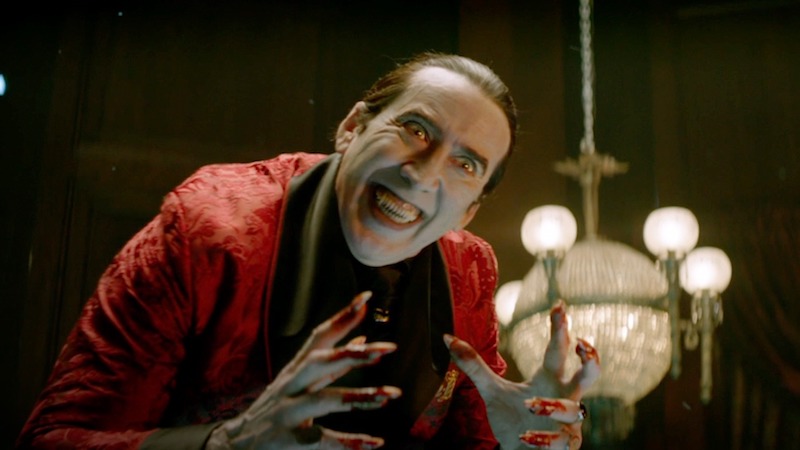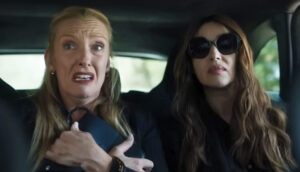Sometimes less is more.
Sometimes more is less (more or less).
Exhibit A for both: “Renfield” (R, 93 minutes, in theaters).
I couldn’t wait to see this horror comedy.
Why? The trailer.
It’s hilarious.
In it, R.M. Renfield (Nicholas Hoult) enters a school gym where a support-group meeting for people with codependency issues is in session. Renfield starts sharing with the group about his “toxic relationship” with his boss, when the door cracks open and a cane appears.
“Hi. Are you here for the meeting?” the facilitator calls outs, cheerfully. “Well, come on down!”
“No-o-o-o!” Renfield cries.
But it’s too late.
Welcome, Renfield’s master, Count Dracula. And he’s played by none other than Nicolas Cage. “Now, let’s eat!” the pasty-faced, razor-toothed vampire Cage declares with a deranged look of anticipation.
Talk about perfect, uproarious casting: Cage, who has turned overacting into an art, to go full-tilt bonkers as the latest Dracula.
Hoult also draws laughs as the much-put-upon minion Renfield, who becomes a super killing machine whenever he eats bugs. When he creates bloody mayhem in a bar, Awkwafina, as a cop, asks him, “Did I see you cut a guy with a decorative serving platter?”
All of this and more is contained in the trailer, which runs 2 minutes and 22 seconds.
It’s so much better than the movie it promotes.
Not that “Renfield” – the full-length, feature film “Renfield,” directed by Chris McKay (“The Tomorrow War”) – is bad. There are a lot of laughs. Opening scenes that spoof old black-and-white “Dracula” movies are great. The ongoing support-group gag works. Cage goes over the top, as hoped, and you can’t help but marvel at him at his unabashed lunacy. Awkwafina is underused, but Hoult is just right as a guy who’s trying to escape a situation that’s so awful it’s amusing. And the violence – like that in, say, “Cocaine Bear” – is so extreme that it makes you guffaw even as you grimace.
But it’s all a bit much after a while. Even the Cage schtick gets tired. And yet the movie also offers a bit too little. There’s not enough variety to fill 93 minutes.
Maybe it’s not fair that the trailer raises our expectations so high that the film doesn’t live up to them. But, guess what? Life isn’t fair. **½ for the movie; **** for the trailer.
Reichardt and Williams, together again
Filmmaker Kelly Reichardt likes to challenge moviegoers. Her work is often so low-key, so understated, so seemingly ordinary and uneventful, that she risks putting the audience to sleep.
In the meantime, though, Reichardt somehow subtly manages to draw you into her stories and characters, and you find yourself strangely moved – even if you can’t always account for why.
Her latest film, “Showing Up” (R, 108 minutes, in theaters), is like that. It creeps up on you. And while I wouldn’t rank it with the writer-director’s best work (including “First Cow” and “Certain Women”), it provides a thought-provoking look at artists, and why they do what they do. It also showcases just how good – and daring – an actress Michelle Williams can be. This is the fourth Reichardt-Williams film collaboration, and it’s easy to see why they’ve worked together so often.
Williams plays Lizzy, a sculptor in Portland, Oregon, who lives for her art and, seemingly, little else. Though she takes a keen interest in her work, she mostly walks about with a joyless, put-upon expression. She’s not quite the Debbie Downer of the art world, but close. She sports her dour demeanor when she’s working as an administrative assistant for her mother (Maryann Plunkett) at an art school. She wears it while walking around her apartment, which she rents from a more successful artist, Jo (Hong Chau), who lives next door. (Lizzy’s frustrated because her heater is broken and she’s not getting hot water, and Jo has dragged her feet on getting it fixed.) She looks uneasy when communicating – well, trying to communicate – with her mother, her retired artist father (Judd Hirsch) and her bipolar brother (John Magaro).
She doesn’t exactly brighten when she works on her art, but you can tell this is what she lives for. She creates detailed figurines of women in various poses and with various expressions. There’s curious, enigmatic pieces; you feel like you could spend a lot of time examining, and trying to interpret, each one. They’re like Reichardt’s movies, or the characters in them.
Lizzy is preparing for a show, and it’s a big deal for her. But what exactly she hopes to accomplish through it – a financial or critical breakthrough, an acknowledgement from her family – remains a mystery.
That mystery is at the heart of the film. Why do artists pursue their work? Throughout the movie, Reichardt keeps her camera on students at the art school, and Lizzy, methodically grinding out the time-consuming, often repetitive work needed to finish their creations. Is the creative process itself enough of a reward for them? Is the appreciation of others the endgame? What, if anything, qualifies as “a win”?
For that matter, what qualifies as art? What makes Lizzy’s figurines so fascinating? What is it about Reichardt’s films, and Williams’ acting, that makes us feel the richer for it? ***
And now for something truly terrible …
It’s been a while since I’ve seen anything as dumbfoundedly awful as “Mafia Mamma” (R, 101 minutes, in theaters).
Directed by Catherine Hardwick (“Thirteen,” “Twilight”), it stars Toni Collette and Monica Bellucci. Not even 10 minutes into this painfully unfunny comedy, I was asking myself: Did these actresses lose a bet? Did someone blackmail them into doing this dreck?
And the movie doesn’t get better. (Yes, I forced myself to sit through the whole thing.)
Collette stars as Kristin, an American wife and mom. First, she has to deal with her son going off to college. Then, she discovers her husband having sex with the son’s guidance counselor in their basement.
As she hurriedly dresses, the counselor declares herself a feminist and says to Kristin, “I support your right to be angry.”
This is supposed to be funny.
Clunk.
Later, Kristin is invited to Italy to attend the funeral of a grandfather she never knew. It turns out Granddad was – as you might guess from the title – a Mafia don. His consigliera (Bellucci) informs Kristin that she’s to take on his role as mob leader.
Kristin – played by Collette in a ditsy mode that suggests she wants to be Jennifer Coolidge – is slow to pick up on this.
“I’m still in the dark here,” she says.
So a mob henchman turns on a lamp.
Clunk.
It turns out there are two mobs in a violent power struggle, and one of several lame running gags is that whenever one of the gangs hears the name of the other, the mobsters respond by spitting on the floor in unison.
Clunk.
Meanwhile, Kristin, who hadn’t had sex with her husband in three years, is unabashedly horny, and she soon finds herself ready to bed the head of the rival gang. Only, he has a surprise up his … well, he passes gas to expel a deadly vial.
Clunk.
Later, Kristin pukes on a corpse.
Clunk.
And so it goes.
By the way, there’s an important message here – or, at least, the film suggests there is. You see, Kristin has always been a people pleaser, who puts the needs of others ahead of her own. But she’s about to discover her independence. She’s going to realize that she doesn’t need a man to validate herself!
Well. Amen to that. Zero stars … a bomb.
Tim Miller is co-president of the Boston Society of Film Critics. He teaches film and journalism at Cape Cod Community College in West Barnstable. You can contact Tim at [email protected] or follow him onTwitter @TimMillerCritic. Or you can ignore him completely.



































